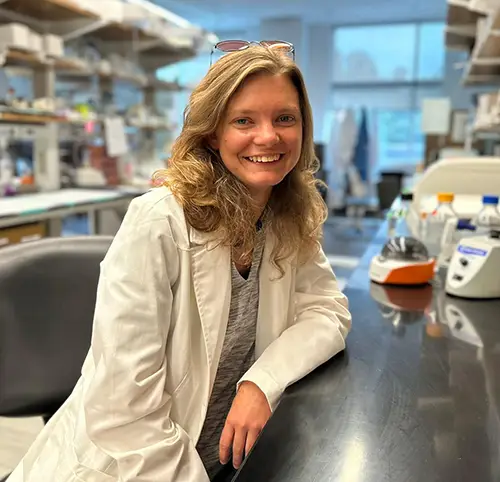Ward Investigating How Membranes Affect Proteins

Alyssa Ward’s interest in the natural sciences started early. “Believe it or not, it all started with a milk carton,” she said. “My dad and I were doing our annual father-daughter Christmas breakfast. I ordered chocolate milk with breakfast. When it arrived at the table, I turned the carton around and began asking questions about how the ingredients and chemicals listed under the nutritional information were calculated. Then I asked that simple question—Why? Since then, my fascination and love of the sciences has grown into my career field of choice. From my grade school years to my current graduate studies, I have truly developed an appreciation for the many disciplines of science.”
Her curiosity led her to pursue an Associate of Science degree from Cleveland State Community College, where she started her interest in proteins. A conversation with a former professor led Ward, a first-generation college student, to apply to Maryville College, where she went on to obtain a BS in biology and chemistry. While at Maryville College, Ward interned with Cornerstone Analytical Laboratories to gain hands-on experience with biophysical techniques. She also participated in a research project at Maryville College that led to a senior honors project and research presentations at the Appalachian College Association and Annual Biomedical Conference for Minority Students (ABCMS) meetings.
Many factors influenced Ward’s choice to come to UT for a doctorate, but one stands out. “While attending ABCMS, I met a former UT graduate who explained the academic journey using an analogy: ‘Undergraduate studies are like browsing a bookshelf and deciding on a book to read. Earning a master’s degree is like being able to memorize a few chapters of that book. When one has added a new chapter to the book, you have become a philosopher.’ This analogy alongside my educational experiences shaped my perspective of what type of chapter I wanted to contribute to science,” Ward said. “Keeping this in mind, I joined Associate Professor Francisco Barrera’s lab with the idea that my project could span from identifying structural aspects to overall cellular behavior.”
Her current research is focused on how cholesterol affects protein dimerization and localization in the cell of the ROR receptor tyrosine kinases. “My end goal is to help bridge the gap of our understanding on how external factors govern the activation of ROR1 and ROR2 through dimerization so both current and future therapeutics targeting these receptors can account for these factors to improve their efficacy,” she said.
To keep a good work-life balance, Ward enjoys outdoor activities such as rock climbing and archery. But mainly, she continues to “research” her other lifelong passion, martial arts. “Through the years I have been able to find numerous parallels between martial arts and science,” she said. “With the saying that martial arts are as much a science as an art, and that science is as much an art as it is science. You need both creativity and physical knowledge to understand and learn from them. Both have long-term and short-term aspects, and it is easy to get lost in the details!”